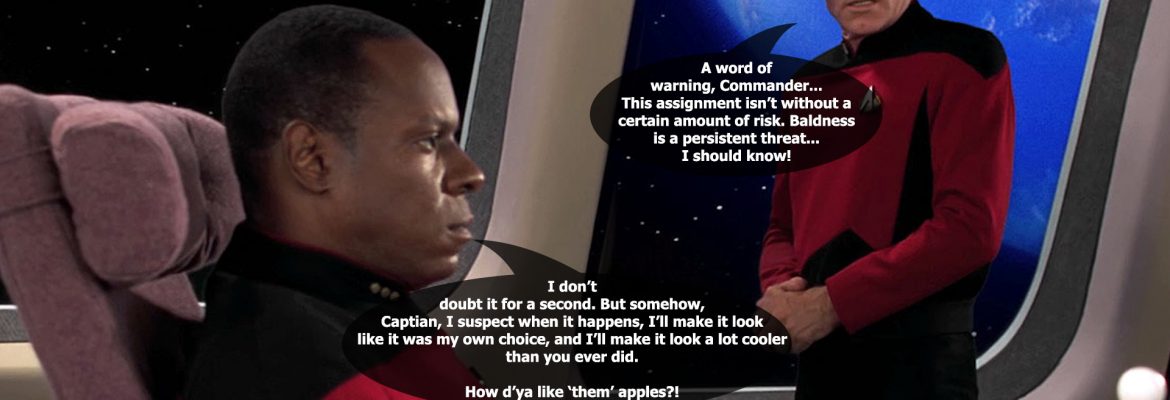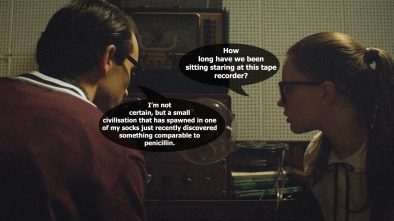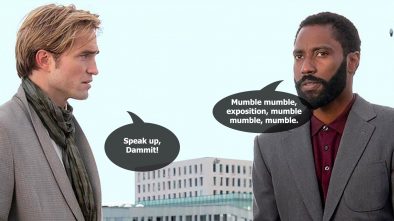Nine out of Ten
A look at the TV Series ‘Star Trek: Deep Space Nine’ created by Rick Berman & Michael Piller and starring Avery Brooks.
Star Trek is a pretty divisive thing to talk about. So many dismiss it as nonsense without ever ‘actually’ watching it because they once saw five minutes of William Shatner over-acting a few lines whilst extras milled about in minidresses and flares.
I’m under no allusions. Perhaps if that had been my first introduction to Trek, I might have thought it was all a campy, poorly budgeted and ultra-niche thing too. As it happens, I grew up with ‘Next Generation’ and the equally as divisive Patrick Stewart, but I greatly admired the show and slowly became a proud Trekkie.
I was there, poised and ready in my bedroom in front of the TV, bars of chocolate and cold fizzy drinks to hand for the UK premiere of ‘Voyager’ when it finally launched. I appreciated ‘Voyager’ for being an evolution of the Star Trek concept, for introducing character conflicts that the USS Enterprise hadn’t been well-equipped to provide, and for placing the focus back on discovering new places.
But it’s important to note, that ‘Deep Space Nine’, henceforth referred to as ‘DS9’ for the sake of my poor typing fingers, began much earlier. ‘DS9’ is the second spin-off series while ‘Voyager’ was the third. So, why did I skip this step and go straight to ‘Voyager’?
Primarily, it has to come down to ignorance; ‘DS9’ was launching as a series right around the time I was starting to really notice Star Trek and my young mind couldn’t understand the concept. Trek had always been about exploring strange new worlds, and I figured that wasn’t likely to happen on a space station. And so I dismissed it as a ‘blip’ that would quickly vanish.
I’d occasionally catch a few moments of ‘DS9’ and with prejudice clouding my judgment, I quickly established that there wasn’t a great deal going on and that it was a tedious show about a tedious place. I had ‘TNG’ and ‘Voy’ for all my real Star Trek needs, so “that silly other show” continued to go neglected. And I was okay with that.
It was probably a shade over ten years later when I was in my mid-twenties that the entire Star Trek saga was being released in DVD boxsets and I was eager to get them all. ‘The Original Series’, ‘Next Generation’, ‘Voyager’, all added to my library. But it became clear I was leaving a big hole in the timeline.
‘DS9’ had concluded a few years earlier after its mandated seven year run and had proven to be as big a part of the Trek estate as any of the others. And so I bought all the DVD’s for ‘DS9’ too. It made sense that I would have to watch them all, but I remember being very nervous about doing so, especially since I’d already formed such a strong stance against it.
I actually get a bit of a thrill now when a film, TV show, or a music album I’m really anticipating becomes a let down. For example, a musician I’ve admired all my life, Jean-Michel Jarre, released his ‘Equinoxe Infinity’ album a couple of years ago. I bought it without ever having heard it because that’s the effect he has on me.
Listening to the album for the first time was a crushing disappointment. It seemed to be a chaotic, discordant mess that wafted around, had a bit of an identity crisis, then petered out with a bit of a whimper. But, you know what? After listening to it again, and again, and again, I started hearing it properly. Recognising little calls back to the first ‘Equinoxe’ album, appreciating the cleverness of how the soundscapes built up, developed and evolved and how it told its own little stories in the music.
I’ve had other albums do it too. First playthrough is a disaster, but subsequent goes keep getting better. A couple of such examples have gone on to be firm favourites of mine.
I’m going to say that ‘DS9’ is the first such example of something I hated on my first approach, but that just keeps getting stronger the more I’m exposed to it. When I did the watch through on DVD, I got to meet the characters properly, understand where they were coming from, where they were going and why I should care about them.
The pilot episode has a passing of the torch as Picard from ‘TNG’ makes an appearance to bridge the gap between the two series. It’s a nice touch that works well and also helps to provide our new lead, Commander Sisko – played by the inimitable Avery Brooks – with some background and depth.
Brooks’ Sisko is a breath of fresh air in Star Trek, as is all of DS9. But a series always needs a strong lead and ‘DS9’ was so lucky that it got such a strong performer to take that role. Initially, he was a little downbeat and low-key, but as he got his feet comfortable under the commander’s desk, and later lost his hair, so he began to come to life in a way that only Brooks could.
He has an energy about him, a certain way that makes his Sisko a powerhouse with no opposition. He’s a commanding presence and brings his scenes to life with performances that ought to be the envy of any good theatre actor.
The rest of the cast are also good. Though it takes a few of them a couple of episodes to truly nail down their characters mannerisms and voices. Once they slip into the groove, they absolutely run with it and the dream team forms.
‘DS9’ was always meant to be a different kind of show for Trek, allowing the stories to come to them instead of travelling to the stories, and as such, we have a chance to see real development of story arcs and lore as the environment around the space station becomes the main focus.
And this is the truly remarkable part about ‘DS9’; its ability to keep telling powerful and relevant stories using a science fiction context to make it palatable.
We’ve been doing it for decades; taking matters of race, religion, war, forbidden love, lust, hate, and everything in between, and we’ve been telling stories about it. But sometimes, when to tell a story in its original form may be a bit blunt-force, we change names and create composite characters for dramatic purposes.
And then we get great moments in television where very serious matters can be addressed in an indirect manner. And even though we know what they’re really saying, we don’t feel preached to because the message was delivered subtly and cleverly in a fictional setting.
The continuing story of how planet Bajor and its people recover after decades of occupation from a dominant force echo closely with any massive war where a population was oppressed, but speaks closest of all to the holocaust during the second world war. The treatment and perception of so-called collaborators, children born to parents who represent both sides of the conflict… It makes for powerful and compelling watching.
The series became unique in Trek for its long story arcs. Though the Dominion War, the most famous arc in ‘DS9’s run, only really accounted for the last two seasons, because the Dominion and its member species had been referred to as early as the first season, it feels like it ties together better than it actually does.
It’s still predominantly individual episodes that tell their own self-contained story, much like what people are familiar with in a weekly TV show, but there is often a theme that keeps it all flowing together and always enough going on with the characters to trick us into thinking that it’s all a continuation from where we left off.
Picard’s Enterprise was a clean ship, with a hard working, honest crew. The space station in ‘DS9’ is none of those things. It’s a former ore-processing plant where ne’er-do-wells and oddballs can pass through at their leisure. We don’t just have the prim-and-proper Starfleet types to concentrate on, we have the Bajoran people, most of whom were resistance fighters during the occupation of their planet, so they play dirty and aren’t used to rules and regulations. You have the unscrupulous Ferengi barman who’d sell his own family if it would earn him more profit and you have the new breakaway terrorist faction who disagree with concessions made in a new peace treaty that saw them turned into refugees overnight.
This is an unhappy part of space and so the tone of the show is darker than Trek ought to have been. But this was intentional, and for all the flak that the show-runners got, this was exactly the right thing for ‘DS9’. It may not be as ‘gritty’ or as ‘dark’ as many modern audiences seem to crave nowadays, but we must remember that this was late nineties Star Trek and there was only so far it could be pushed. Still, it’s about as honest a portrayal of our futuristic selves as we could hope to see.
It allowed us to put our honest Starfleet types into a chaotic environment and let a little of the good seep into the bad, and a little of the bad to seep into the good. And so we get shady characters making heroic and heartfelt gestures, and we get honest officers making some very dubious command decisions. We get to witness personal vendettas, sabotage, and even outright deception on a massive scale from the most unlikely places. It plays fast and loose with the rules of Star Trek and it is so much better for doing so. Always keeping you wondering who is really capable of what and what it will be that they do next.
There’s still enough of the old Trek formula for the hardcore Trekkies though. They’ll still have some ship-based episodes where mysteries on a planet need to be resolved, holodeck adventures, time-travel daftness and even, for better or worse, the same old incidental music the binds it all together.
There’s been a couple of good music cues in the Star Trek background music catalogue over the years, but, for the most part, it’s all pretty awful. There’s too much of it and it takes you out of the moment. It’s a distraction above all else. ‘TNG’ was the same. And the worst part of it is the rising crescendo that it does at the end of every teaser segment and at the end of each scene where the advert breaks would have been.
It’s the kind of thing that you (sort of) become a bit immune to if you watch enough of it, but I can’t help wonder how much better these ‘old’ Treks could have been if the music had been scaled down by about fifty percent.
But that really has to be the only real criticism of ‘DS9’. Sure, many of the special effects look quite amateurish by today’s standards, but when you consider this was a show being made on a restricted budget in the nineties, they do the job as well as they could have done at the time and should not be held against it now.
And every show has its share of stinkers… Episodes people wish were never made. Every show has them, at least every long-running show. ‘DS9’ manages to have a couple of howlers but remains more consistent with higher quality content than ‘TNG’ and even ‘Voy’ manged in their runs.
The nature of television has changed a lot in the years since the old Treks aired. One could argue that this sort of television doesn’t have a place in today’s world. Too many people want a continuous story arc and feel that the story-of-the-week format is too fragmented.
I disagree. I think that with television producers trying to make everything grand, complicated and continuous, quality is diminishing as they don’t have enough content to adequately fill the required run of episodes ordered by the networks/studios. Thus, things get watered down, episodes are made where so little happens, you actually look forward to the advert breaks.
And while many consider Star Trek to be the zone of the geek, or nerd, or for the bespectacled loner who huddles in his little bedroom with only books for company, let us not forget that Harry Potter fits the same description as the latter.
I’m not trying to suggest that Harry Potter was a closet sci-fi enthusiast, I mention it purely to show that these unhealthy stereotypes serve no purpose. What’s the difference between a sci-fi show set a few hundred years in the future, or a show about gangsters in early 20th century England? Not a great deal, probably. I’m sure both find ways of covering the deep and difficult subjects of the human condition, giving us stories and events that we can process and understand through their fictional setting to help us better understand why we are the way we are today.
‘DS9’ may be a part of the Trek universe. But just like ‘Joker’ and ‘Deadpool’ were both parts of their respective universes, they broke out of the normal format and set the world ablaze with their own styles and personalities.
This is Treks ‘Joker’. This is Treks ‘Deadpool’. This is Trek for the wider audience. This is Trek that anyone can get behind if they can cast off their prejudice. I’m not trying to suggest that its appeal is universal. Of course, there will still be those who will not enjoy it and have legitimate reasons for not doing so. But for anyone who has some time to kill and wants a strong series that doesn’t treat its audience like morons, ‘DS9’ is a great place to be.
It’s the ultimate non-sequitur; it’s an imperfect show, about imperfect people in and imperfect environment. And that’s why it’s the perfect science fiction show and why it ought to be the gateway for ‘normal folk’ to enter the den of geek and get their Star Trek boots on.
What are you waiting for?
A reason why you should watch it: Even if it isn’t ‘amazing’ television, it’s fantastic Star Trek.
A reason why you shouldn’t watch it: Incidental-music crescendo’s do bad things for your blood pressure.



